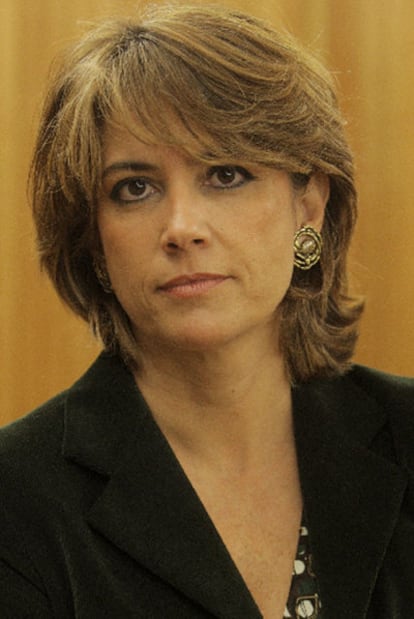Spanish lawyer to pen Gaddafi's warrant
Prosecutor Dolores Delgado chosen to join ICC team in dictator's case
Dolores Delgado has been a strong advocate of prosecuting dictators and other political leaders for crimes based on gender bias. She has been an important figure in Spain in the fight against international terrorism and human rights violations.
Now Delgado, a prosecutor at Spain's High Court, has been tapped by the International Criminal Court (ICC) to help write up an international arrest warrant against Muammar Gaddafi for alleged war crimes against his own Libyan people, which could eventually lead to his facing prosecution before The Hague tribunal, sources told EL PAÍS this week.
The ICC team will be made up of three officials, including Delgado who will serve as an advisor coordinating the legal aspects of the indictment against the dictator. The next step would be for prosecutors to present the case to ICC judges who will then decide whether or not to issue the arrest warrant against Gaddafi and other Libyan leaders based on the evidence they have, according to a press statement released in The Hague.
An expert in radical Islamist cells and also versed in the doctrine of international jurisdiction, Delgado has worked closely with High Court Judge Baltasar Garzón in prosecuting many defendants, including former officials of the Argentinean dictatorship for crimes against humanity. Garzón is currently working as a legal advisor at the ICC.
One of the most chilling cases she handled was that of Adolfo Scilingo, a former naval officer who is serving a 30 year sentence in Spain after he was convicted in 2005 for helping coordinate death flights over the River Plate during Argentina's Dirty War. The murder charges related to 30 drugged political prisoners who were thrown out of military jets and helicopters during the military junta's attempt to wipe out leftist insurgents between 1976 and 1983.
ICC chief prosecutor Luis Moreno-Ocampo had asked her to become part of a team to investigate the crimes in Darfur but Delgado was unable to go. However, this time, she has received the OK from both High Court chief prosecutor Javier Zaragoza and Attorney General Cándido Conde-Pumpido.
Moreno-Ocampo is scheduled to present his case against Gaddafi before the UN General Assembly on May 4. Legal sources say there is enough evidence that the Libyan colonel has used his own forces to bomb civilians, including children, to indict him on crimes against humanity. However, they say there is no evidence to charge him with genocide because there have been no allegations at this point that he has tried to exterminate any particular ethnic, religious or political groups.
Delgado has taken part in many international panels in recent years. Last year, she helped argue for the need to include gender-based crimes in trials that are taking place against former military leaders in Argentina. Many women were raped and killed during the Dirty War period while they were in secret detention.
Among her high-profile cases in Spain have been the prosecution of mafia capo Zakhar Kalashov, who is wanted for crimes in Georgia; Operation Tigris, aimed at 14 men from an Islamist cell who took part in the March 11 train bombings; and several cases involving ETA.
"Spain is one of a group of Western countries that are very closely threatened by Al Qaeda," Delgado said in a 2008 EL PAÍS interview. "Spain is constantly in the sights of the terrorists. For that reason we cannot let down our guard."
A native of Madrid, Delgado got her start with the High Court in 1993 as anti-drug prosecutor. During her time while she was involved in the prosecution of different Islamist cells, she took on cases stemming from the March 11, 2004 train bombings in Madrid that killed 191 people and injured more than 2.000.
In 2008 the Supreme Court's acquittal of 14 of 20 Islamists who were convicted for trying to blow up the High Court building in Madrid. It was a case that she had handled and was disappointed by the ruling. "Evidently we cannot convict people for their ideas, but for their actions, or at least, the spreading of those ideas," she said. "March 11 was a turning point in all investigations into international terrorism. Before then in order to prosecute this type of terrorism you needed to show guns or explosives in order to achieve a conviction."

Tu suscripción se está usando en otro dispositivo
¿Quieres añadir otro usuario a tu suscripción?
Si continúas leyendo en este dispositivo, no se podrá leer en el otro.
FlechaTu suscripción se está usando en otro dispositivo y solo puedes acceder a EL PAÍS desde un dispositivo a la vez.
Si quieres compartir tu cuenta, cambia tu suscripción a la modalidad Premium, así podrás añadir otro usuario. Cada uno accederá con su propia cuenta de email, lo que os permitirá personalizar vuestra experiencia en EL PAÍS.
¿Tienes una suscripción de empresa? Accede aquí para contratar más cuentas.
En el caso de no saber quién está usando tu cuenta, te recomendamos cambiar tu contraseña aquí.
Si decides continuar compartiendo tu cuenta, este mensaje se mostrará en tu dispositivo y en el de la otra persona que está usando tu cuenta de forma indefinida, afectando a tu experiencia de lectura. Puedes consultar aquí los términos y condiciones de la suscripción digital.








































